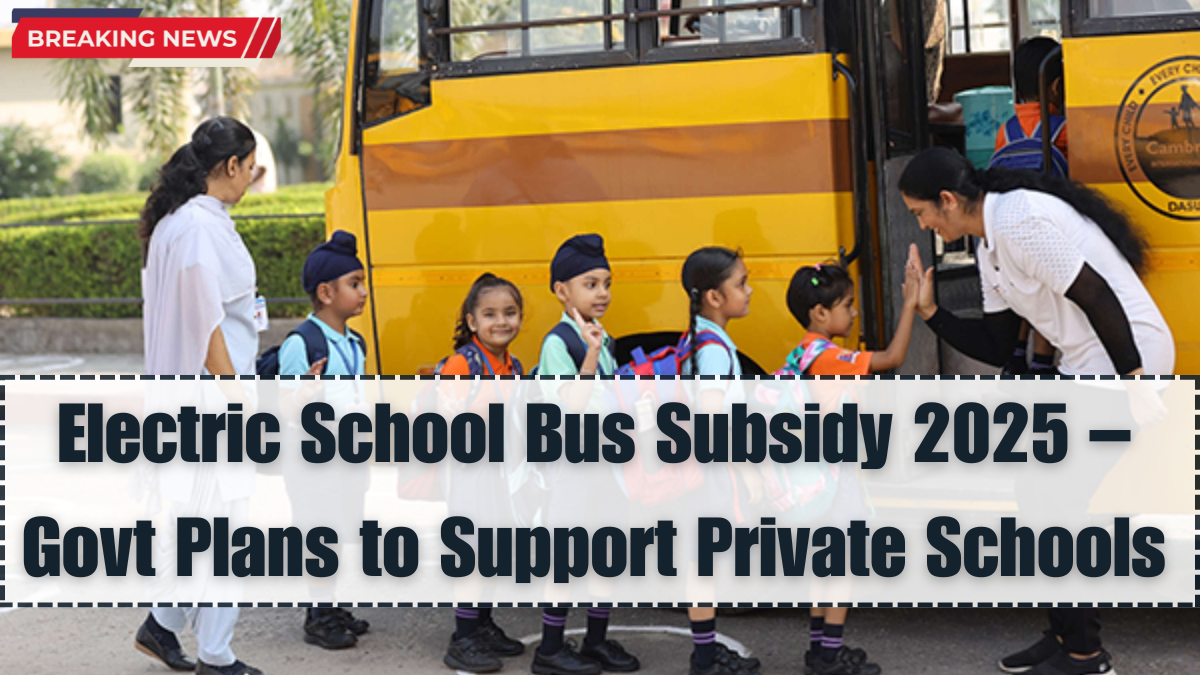The Indian government has launched a progressive initiative under the EV Policy India 2025 to provide financial assistance for private schools to replace their existing diesel school buses with eco-friendly electric buses. This move not only aligns with the country’s green mobility goals but also promotes safer and healthier school transportation for children.
With increasing pollution levels in urban and suburban areas, the EV Policy India 2025 aims to transform school transport infrastructure by supporting electric vehicle (EV) adoption in the education sector. The program provides targeted subsidies, tax exemptions, and low-interest loans to help private schools make the transition quickly and affordably.

Key Highlights of the Electric School Bus Subsidy
The electric school bus scheme under the EV Policy India 2025 is tailored to enable educational institutions to shift to green transport without bearing the full financial burden. The government is encouraging schools to play an active role in India’s transition to cleaner energy.
Key features of the subsidy include:
-
Up to ₹15 lakh subsidy per electric bus (based on bus size and battery capacity)
-
100% road tax exemption for registered EVs used for school transport
-
Interest-free loans from select public sector banks
-
Battery replacement support after 5 years of service
-
Additional benefits for schools in Tier 2 and Tier 3 cities
The EV Policy India 2025 ensures that even smaller and budget-constrained institutions can afford electric buses without compromising on safety or infrastructure.
Eligibility Criteria for Private Schools
To apply for benefits under the EV Policy India 2025, private schools must fulfill certain eligibility conditions. The scheme is currently open to CBSE, ICSE, state board-affiliated, and recognized private educational institutions across India.
Eligibility requirements:
-
Must be a registered and recognized educational institution
-
Own or operate a school transport system
-
Willingness to scrap diesel vehicles older than 10 years
-
Commitment to using only certified EV bus manufacturers
-
Ability to install basic charging infrastructure on school premises
These measures ensure that only qualified schools benefit from the EV Policy India 2025, while also maintaining safety and environmental standards.
How to Apply for the School Bus EV Subsidy
The application process under the EV Policy India 2025 has been simplified through an online portal developed by the Ministry of Education in collaboration with the Ministry of Transport.
Steps to apply:
-
Visit the official EV transport portal and register as an institution
-
Upload required documents (school registration, RC of old buses, land ownership, etc.)
-
Select your preferred certified EV manufacturer from the empaneled list
-
Apply for the subsidy and financing option
-
Await verification and installation of charging points
-
Receive subsidy directly in the school’s account after successful purchase
Schools applying under the EV Policy India 2025 are encouraged to complete the process before the end of the 2025 academic year to avail maximum benefits.
States Leading the EV School Bus Transition
Some states have already taken significant steps toward implementing the EV Policy India 2025 by allocating funds, installing charging stations, and partnering with EV manufacturers.
| State | Buses Converted to EV | Schools Benefited |
|---|---|---|
| Maharashtra | 1,200+ | 950+ |
| Karnataka | 1,000+ | 800+ |
| Delhi NCR | 800+ | 670+ |
| Tamil Nadu | 700+ | 520+ |
| Gujarat | 600+ | 470+ |
These states have shown strong leadership in driving the EV Policy India 2025 goals, making school transport greener and safer for children.
FAQs
What is the EV Policy India 2025?
The EV Policy India 2025 is a government initiative that offers subsidies and incentives to encourage adoption of electric vehicles, including school buses, across India.
How much subsidy can schools get under this scheme?
Private schools can receive up to ₹15 lakh per electric bus under the EV Policy India 2025, depending on the bus size and battery configuration.
Are rural schools eligible for the scheme?
Yes, both urban and rural schools, including those in Tier 2 and Tier 3 cities, can benefit from the EV Policy India 2025.
Can existing diesel buses be upgraded to EVs?
No. The EV Policy India 2025 only supports the replacement of diesel buses with new electric buses, not retrofitting.
Is installing a charging station mandatory?
Yes, schools must install a basic EV charging station on their premises to qualify for the subsidy under the EV Policy India 2025.
Click here to know more.
